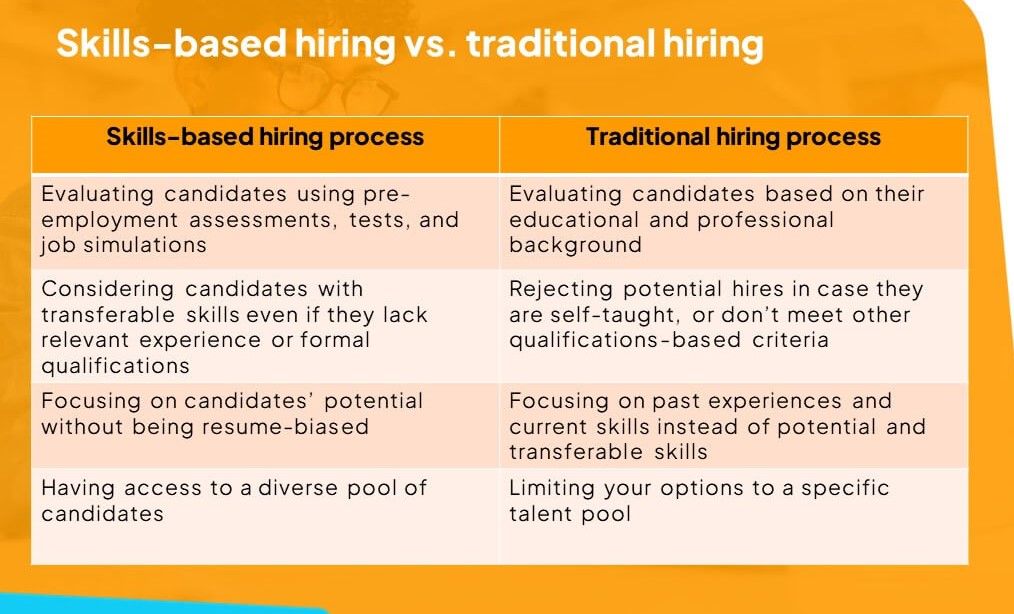The Gap Between Promise and Practice in Skills-Based Hiring
The transition towards skills-based hiring represents a paradigm shift in the labour market, aiming to prioritise individual competencies over traditional educational credentials. Despite the growing consensus on its potential to democratise employment opportunities and align workforce capabilities with the evolving demands of the modern economy, corporations' practical implementation of this approach remains jaded. A comprehensive report released on February 14 by The Burning Glass Institute and Harvard Business School sheds light on the stark disparity between the theoretical embrace of skills-based hiring and its actual execution within the corporate world.

Concerning Trends
The report analyses the hiring practices of a wide array of companies, revealing a concerning trend: a significant portion of firms, approximately 45%, have ostensibly revised their hiring policies to exclude degree requirements, yet these modifications have not translated into tangible changes in their hiring behaviours. This revelation prompts a critical examination of the effectiveness of public commitments to skills-based hiring and underscores the challenges inherent in shifting away from traditional, degree-centric hiring models.
An in-depth review of hiring trends from 2014 to 2023 indicates a notable increase in the number of roles for which degree prerequisites were eliminated. However, this progressive policy shift has not substantially impacted overall hiring practices. Among 11,300 roles scrutinised within large firms, there was only a marginal 3.5 percentage point increase in hiring individuals without a bachelor's degree. This incremental change has a negligible effect on the broader employment landscape, benefiting a fraction of the workforce.
Skills-Based Hiring Policies
The uneven progress among companies adopting skills-based hiring policies further complicates the landscape. The report categorises these entities into three distinct groups: leaders, in-name-only, and backsliders. Leaders genuinely implement skills-based hiring, resulting in a significant increase in the employment of non-degree holders. In contrast, in-name-only companies have made declarations without effectuating real change, and backsliders have reverted to traditional degree-based criteria after initial attempts to adopt skills-based practices.
The adoption of a skills-based hiring approach presents multifaceted challenges. Evaluating skills and competencies is inherently more complex and subjective than assessing formal educational qualifications. This necessitates the development of innovative assessment tools and methodologies and a cultural shift within organisations to value practical skills and experiences over academic degrees.
Adoption of Skills-Based Hiring Practices
Furthermore, the slow pace of adoption of skills-based hiring practices fails to meet market demands, especially in dynamic sectors such as technology. To address the skills gap, some companies have resorted to developing in-house training programs and exploring non-traditional learning opportunities for their employees. While these initiatives are commendable, they do not directly tackle the issue of providing access to employment for skilled individuals lacking formal degrees.
Resources like the toolkit developed by the Society for Human Resource Management Foundation offer valuable guidance for employers navigating the transition to skills-based hiring. This toolkit underscores the importance of incorporating skills data into HR processes and outlines actionable steps to enhance hiring practices, emphasising the use of technology and the promotion of job opportunities in a manner that prioritises diversity and inclusivity.
The critical role of both hard and human centric (soft) skills in the workplace is undeniable. Hard skills, which are tangible and quantifiable, are essential for performing specific job functions. Conversely, human centric skills, such as problem-solving, communication, and teamwork, are crucial for success in today's workplace. LinkedIn data corroborates the importance of human centric skills, demonstrating that individuals possessing a blend of hard and human centric skills advance in their careers more rapidly than those with hard skills alone.
Complexities and Challenges
This analysis highlights the complexities and challenges associated with implementing skills-based hiring practices. The enthusiasm for such approaches is evident, yet realising this vision requires more than mere adjustments to job postings. It demands a fundamental overhaul of hiring methodologies, a commitment to continuous learning and development, and concerted efforts to dismantle the barriers that prevent skilled individuals without formal degrees from accessing employment opportunities.
An Inclusive and Efficient Labor Market
The journey towards an inclusive and efficient labour market, where skills and competencies are valued above formal educational credentials, is fraught with obstacles. Nonetheless, the potential benefits of this transition—enhanced access to employment, a more diverse workforce, and a closer alignment between workforce skills and job requirements—render it a pursuit of great significance. The successful implementation of skills-based hiring hinges on the collective efforts of employers, educators, and policymakers to embrace change, invest in developing comprehensive assessment tools, and cultivate a culture that recognises the intrinsic value of skills and competencies.
As the labour market evolves, the imperative for adopting skills-based hiring becomes increasingly urgent. The current state of affairs, characterised by a significant gap between policy announcements and actual hiring practices, underscores the need for a more concerted and genuine effort to shift towards skills-based hiring. This transition promises to broaden access to employment opportunities for a broader population segment and aligns with the dynamic needs of the modern economy, which increasingly values practical skills and adaptability over traditional academic achievements.
Persistence, Innovation, and Collaboration
While the path to fully realising the potential of skills-based hiring is complex and challenging, the endeavour is both necessary and worthwhile. By fostering a labour market that values skills and competencies, we can create more equitable and efficient pathways to employment, ultimately driving innovation, productivity, and inclusivity in the workforce. The journey ahead requires persistence, innovation, and collaboration across all sectors of society to overcome the entrenched barriers to change and fully embrace the transformative potential of skills-based hiring.



